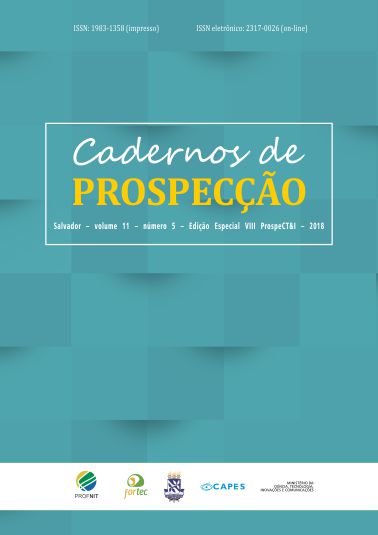Editorial
DOI:
https://doi.org/10.9771/cp.v11i5.29593Abstract
This special edition of Cadernos de Prospecção renews the importance of strategies for popularizing studies, actions and projects that improve and strengthen the National System of Science, Technology and Innovation (SNCTI).From an institutional point of view, Brazil and its SNCTI have advanced considerably since the beginning of the 2000s with the creation of the Sectoral Funds; the Industrial, Technological and Foreign Trade Policy (PITCE) in 2003; the Innovation Law in 2004; the Lei do Bem in 2005;
the Science, Technology and Innovation Action Plan (PACTI) in 2007; the two Production Development Policies (PDP) in 2008 and 2010; the Brasil Maior Plan (PBM) in 2011; the National Strategy for Science, Technology and Innovation (ENCTI) in 2012; the creation of the Company of Research and Industrial Innovation (EMBRAPII) and the Inova Empresa Plan in 2013; the launch of the National Knowledge Platforms Program in 2014; the Project of Law no. 2,177, of August 31, 2011, which established the National Code of Science, Technology and Innovation in 2015; the approval of the New Legal Framework for Biodiversity in 2016; Constitutional Amendment 85, of February 26, 2015, and the approval of the New Regulatory Framework for Science, Technology and Innovation (CT&I) - Law 13,243, of January 11, 2016 -, which amended deeply the regulation pertinent to the national policy in these areas. A significant institutional step must be taken in adapting or creating state and municipal laws that verticalize the rules and ordering of the New National Framework, reinforcing regionally and locally the SNCTI, which has suffered from discontinuities in security policies. financing and promotion and with the historic macroeconomic environment that punishes the business initiative, especially one that depends on high-risk investments and involves technological innovation projects, with medium and long-term prospects. Representative entities have spared no effort to reverse the shortage situation that Brazil presents in the current context, which has allowed investments in ST&I to fall to 1% Gross Domestic Product (GDP) on average, while in 2007, Israel and South Korea invested 4%; Japan, 3.5%; United States, 2.7%; Germany, 2.8%; and China, 2.5%.
In this sense, Brazilian associations that articulate and act as pressure groups in defense of national sovereignty and the strengthening of our ST&I system are of vital importance, such as: the Brazilian Society for the Progress of Science (SBPC), the Brazilian Academy of Sciences ( ABC), the National Council of State Secretaries for ST&I Matters (CONSECTI), the National Council of State Foundations for Research Support (CONFAP), the National Association of Entities Promoting Innovative Enterprises (Anprotec), the Brazilian Support Service for Micro and Small Enterprises (Sebrae), the National Forum of Innovation and Technology Transfer Managers (Fortec) etc. Even with all the effort made in recent decades, precisely after the 1988 Constitution, which incorporated Chapter IV dedicated to ST&I, Brazilian society is still very lacking in information and knowledge about how this system has served it and what is its strategic role for the economic and social development of the country. The Prospecting Notebooks fulfill this task. As readers will notice. These are works of fundamental importance, to assist policy decisions by managers in ST&I, on institutional experiences, models of public policy analysis and construction of indicators and information bank, analysis of difficulties, limits and advances in technology transfer processes and, most importantly, studies that explore the accumulated potential of Brazilian knowledge associated with technological innovations. May this newest edition of Cadernos de Prospecção be received by the broad interested academic community, by public managers, by institutions, by the private sector, who bet on basic and applied sciences to advance in the generation of wealth, among others, with the same enthusiasm with which authors and scientists move along the paths of knowledge and the battle for an even more lofty Brazilian science. Happy reading and good use of this rich material
Downloads
Download data is not yet available.
Downloads
Published
2018-12-10
How to Cite
Gomes, F. G. (2018). Editorial. Cadernos De Prospecção, 11(5), 1225. https://doi.org/10.9771/cp.v11i5.29593
Issue
Section
Editorial
License
Copyright (c) 2019 Cadernos de Prospecção

This work is licensed under a Creative Commons Attribution-NonCommercial 4.0 International License.
O autor declara que: - Todos os autores foram nomeados. - Está submetendo o manuscrito com o consentimento dos outros autores. - Caso o trabalho submetido tiver sido contratado por algum empregador, tem o consentimento do referido empregador. - Os autores estão cientes de que é condição de publicação que os manuscritos submetidos a esta revista não tenham sido publicados anteriormente e não sejam submetidos ou publicados simultaneamente em outro periódico sem prévia autorização do Conselho Editorial. - Os autores concordam que o seu artigo ou parte dele possa ser distribuído e/ou reproduzido por qualquer forma, incluindo traduções, desde que sejam citados de modo completo esta revista e os autores do manuscrito. - Revista Cadernos de Prospecção está licenciado com uma Licença Creative Commons Attribution 4.0. Esta licença permite que outros remixem, adaptem e criem a partir do seu trabalho para fins não comerciais, e embora os novos trabalhos tenham de lhe atribuir o devido crédito e não possam ser usados para fins comerciais, os usuários não têm de licenciar esses trabalhos derivados sob os mesmos termos.
Este obra está licenciado com uma Licença Creative Commons Atribuição 4.0 Internacional.





